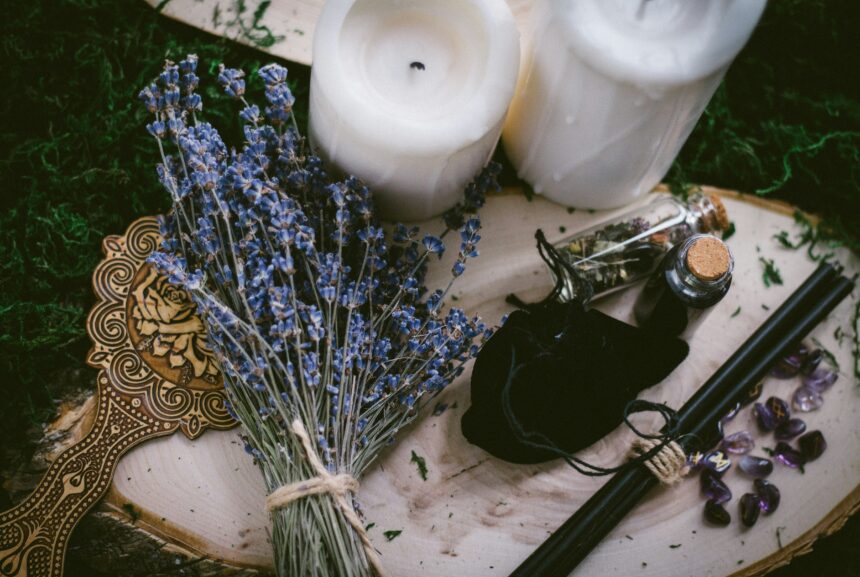Photo by Ksenia Yakovleva on Unsplash
Griffin Dunne’s 1998 cult classic Practical Magic may be remembered for its cozy New England aesthetic, margarita nights, and the irresistible charm of Sandra Bullock and Nicole Kidman as the Owens sisters—but beneath its whimsical surface, the film is a rich text for exploring gender, sexuality, and feminist resistance. This is not just a movie about magic. It’s about women’s agency, the cultural punishment of female desire, and the resilience of sisterhood in the face of patriarchal suspicion.
The Owens Curse as a Metaphor for Policing Women’s Choices
In Practical Magic, the Owens women are burdened with a generational curse: any man they fall in love with is doomed to die. While on the surface, it’s a supernatural plot device, thematically, it works as a metaphor for the historic linking of female sexuality to punishment. From biblical myths like Eve’s expulsion from Eden or the demonization of Lilith, to the witch trials of Europe and Salem, women who pursued pleasure or acted outside the control of men have been branded as dangerous.
The curse mirrors the double bind women face—want love and intimacy, and risk loss or harm; choose independence, and be shamed or ostracized. It’s no accident that the women in the Owens family live on the outskirts of town, both literally and socially. They are “othered” in ways that connect directly to historical narratives around witches, widowhood, and unmarried women.
Sisterhood as a Form of Queer and Feminist Resistance
While Practical Magic does feature romance, its most enduring relationship is between Sally (Sandra Bullock) and Gillian (Nicole Kidman). Their love for each other defies societal expectations that a woman’s deepest bond should be with a male partner. In fact, much of the film’s emotional core is about the ways women show up for each other in times of crisis—protecting each other from abuse, confronting supernatural danger, and surviving grief together.
The film’s vision of the aunts (Stockard Channing and Dianne Wiest) further queers traditional family structures. They live outside the nuclear family model, raising the sisters in a matriarchal household steeped in love, freedom, and magical tradition. There’s no man in the house, no patriarch to enforce “rules”—just women supporting women.
Magic, Desire, and the Reclamation of Power
In the film, magic is tied to desire. Sally’s childhood spell to create her “perfect man” is rooted in both innocence and a resistance to heteronormative romance. Gillian’s magic, meanwhile, is bound to her sexual freedom, which the town—and the narrative—frames as dangerous but also intoxicating. In patriarchal histories, sexually autonomous women have often been branded as witches, succubi, or corrupters of men.
The way Practical Magic handles Gillian’s abusive relationship with Jimmy Angelov (Goran Višnjić) also speaks volumes. Abuse here is a metaphorical demon as well as a literal one—Jimmy’s possession of Gillian mirrors the ways abusive men attempt to control women’s autonomy. His death (and undead return) becomes a darkly comedic but cathartic exorcism of patriarchal violence.
Women’s Work, Women’s Magic
Herbalism, potion-making, and intuitive healing—core aspects of the Owens’ magic—have deep historical ties to midwives, herbalists, and “wise women” who were often targeted as witches in early modern Europe. Silvia Federici’s Caliban and the Witch makes clear that witch hunts were as much about controlling women’s reproductive labor as they were about religious fears. The Owens’ magic isn’t about spectacle—it’s about care, healing, and survival.
Even the climactic exorcism scene centers women’s labor. The town’s women, who have gossiped about and ostracized the Owens family for years, unite to save Gillian. In doing so, they reject the cultural scripts that pit women against one another and instead channel collective power.
The Queer Subtext of Practical Magic
While the film doesn’t explicitly address queerness, its DNA is deeply queer-coded. The Owens women are outsiders living in chosen family structures, they reject male authority, and their deepest loyalties are to each other. The film’s magical realism invites readings of queerness as a form of otherness that is both feared and desired.
A Cozy Feminist Spell That Still Holds Power
More than two decades after its release, Practical Magic remains a rare example of a mainstream Hollywood film that centers women’s emotional complexity, bodily autonomy, and intimate bonds with each other. It celebrates female power while acknowledging the societal forces that try to contain it. It’s a reminder that magic—whether in the form of literal spells or simply in women taking care of each other—is an act of survival and rebellion.
Or, as the aunts would say: “There’s a little witch in all of us.”


Leave a Reply